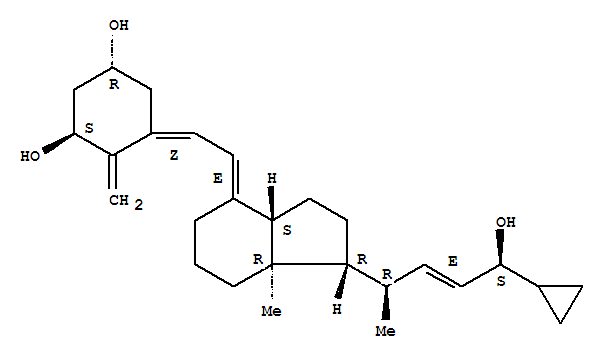| Identification |
| Name: | Calcipotriene |
| Synonyms: | 9,10-Secochola-5,7,10(19),22-tetraene-1,3,24-triol,24-cyclopropyl-, (1a,3b,5Z,7E,22E,24S)- (9CI);Calciptriol;Daivonex;Dovonex;MC 903;PRI 2201;Psorcutan; |
| CAS: | 112965-21-6 |
| Molecular Formula: | C27H40O3 |
| Molecular Weight: | 412.61 |
| InChI: | InChI=1S/C27H40O3/c1-17(6-13-25(29)20-8-9-20)23-11-12-24-19(5-4-14-27(23,24)3)7-10-21-15-22(28)16-26(30)18(21)2/h6-7,10,13,17,20,22-26,28-30H,2,4-5,8-9,11-12,14-16H2,1,3H3/b13-6+,19-7+,21-10-/t17-,22-,23-,24?,25-,26+,27-/m1/s1 |
| Molecular Structure: |
 |
| Properties |
| Melting Point: | 166-168 oC |
| Flash Point: | 250.6oC |
| Boiling Point: | 582oCat760mmHg |
| Density: | 1.12g/cm3 |
| Solubility: | Insoluble |
| Appearance: | white crystalline solid |
| Specification: |
The efficacy of Calcipotriol (CAS NO.112965-21-6) in the treatment of psoriasis was first noticed by the observation of patients receiving various forms of Vitamin D in an osteoporosis study. The precise mechanism of calcipotriol in remitting psoriasis is not well-understood. However, it has been shown to have comparable affinity with calcitriol for the Vitamin D receptor, while being less than 1% as active as the calcitriol in regulating calcium metabolism.
|
| Biological Activity: | Vitamin D 3 analog that displays minimal effects on calcium homeostasis. Regulates cell differentiation and proliferation; exhibits antiproliferative activity against human HL-60, HL60/MX2, MCF-7, T47D, SCC-25 and mouse WEHI-3 cancer cell lines. |
| Flash Point: | 250.6oC |
| Storage Temperature: | Store in original container in a cool dark place. |
| Usage: | An antipsoriatic. A vitamin D3 analogue with low calcemic activity |
| Safety Data |
| |
 |